Задания на времена года по английскому языку – Tasks «Seasons» — Задания по теме «Времена года»
Tasks «Seasons» — Задания по теме «Времена года»
Lexical Test
«Seasons. Months. Days of the Week»
1. The coldest season of the year is …
a) autumn c) spring
b) winter d) summer
2. The hottest season of the year is …
a) autumn c) spring
b) winter d) summer
3. Pupils have the longest holidays in …
a) autumn c) spring
b) winter d) summer
4. September, October, November are the months of the …
a) autumn c) spring
b) winter d) summer
5. Spring has three months: March, April and …
a) June c) May
b) July d) August
6. New Year starts in …
a) January c) November
b) February d) December
7. Winter months are: December, January and …
a) September c) November
b) October d) February
8. Pupils begin to go to school in …
a) June c) August
b) July d) September
9. We go to school on Monday, Tuesday, Wednesday, Thursday and …
a) Friday c) Sunday
b) Saturday d) July
10. The last day of the week is …
a) Sunday c) Tuesday
b) Monday d) Wednesday
11. Rest days are Saturday and …
a) Thursday c) Sunday
b) Friday d) Monday
12. After Monday goes …
a) Tuesday c) Thursday
b) Wednesday d) Friday
Fill in the blanks
- A year has …… days. 9. A month has …… weeks.
- A leap year has …… days. 10. A week has …… days.
- A year has …… months. 11. A day has …… hours.
- A year has …… seasons. 12. A full-day has …… hours.
- A season has …… months. 13. An hour has …… minutes.
- A season has …… weeks. 14. A minute has …… seconds.
- A season has …… days.
- A month has …… or …… or …… or …… days.
Answer the questions
- What season is after spring?
- What season is before winter?
- What season is between autumn and spring?
- What season is after winter?
- What month is before January?
- What month is after February?
- What month is between April and June?
- What month is between September and November?
- What day of the week is after Tuesday?
- What day of the week is before Thursday?
- What day of the week is between Friday and Sunday?
- What day of the week is after Wednesday?
Translate the sentences
- Monday is the first day of the week.
- February is the second month of the year.
- October is the second month of the autumn.
- April is the second month of the spring.
- On Monday and on Wednesday I go to the music school.
- On Tuesday and on Friday I go to the sports school.
- I like Saturdays and Sundays.
- I don’t like Thursdays.
english-basis.ru
Упражнения «Названия месяцев и времена года» (Months and seasons)
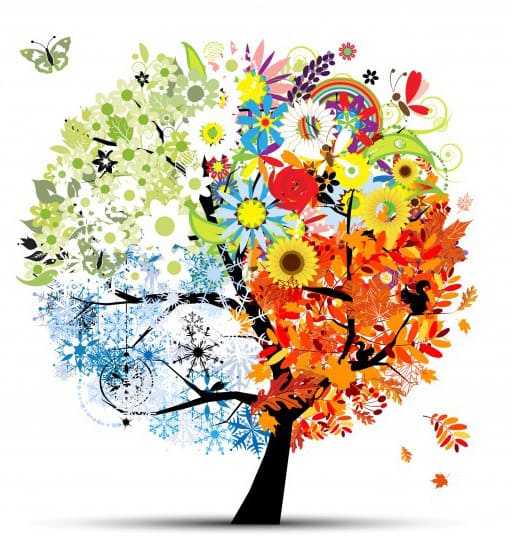
1. Расставьте в названиях месяцев буквы по порядку.
- U S A T G U
- M E D R C E B E
- R E Y U F A R B
- V O E B M E N R
- A L I R P
2. Вставьте пропущенные буквы.
- …an…ary
- Se…tem…er
- J…n…
- …ct…ber
- Ma…c…
3. Напишите для каждого времени года соответствующие названия месяцев.
Autumn —
Winter –
Summer –
4. Завершите предложения.
Н-р: The month after May is … . — The month after May is June. (Месяц после мая – июнь.)
The month before October is … . – The month before October is September. (Месяц перед октябрем – сентябрь.)
- The month after December is … .
- The month after March is … .
- The month after July is … .
- The month before September is … .
- The month before November is … .
- The month before May is … .
5. Напишите название времени года, когда отмечают эти праздники.
- New Year, Christmas –
- Teacher’s Day, Halloween –
- Women’s Day, Easter –
- Russia’s Day, International Children’s Day –
Ответы:
1.
- AUGUST
- DECEMBER
- FEBRUARY
- NOVEMBER
- APRIL
2.
- January
- September
- June
- October
- March
3.
Spring (весна) – March, April, May
Autumn (осень) – September, October, November
Winter (зима) – December, January, February
Summer (лето) – June, July, August
4.
- January (Месяц после декабря – январь.)
- April (Месяц после марта – апрель.)
- August (Месяц после июля – август.)
- August (Месяц перед сентябрем – август.)
- October (Месяц перед ноябрем – октябрь.)
- April (Месяц перед маем – апрель.)
5.
- New Year (Новый год), Christmas (Рождество) – winter (зима)
- Teacher’s Day (День учителя), Halloween (Хэллоуин) – autumn (осень)
- Women’s Day (Женский день), Easter (Пасха) – spring (весна)
- Russia’s Day (День России), International Children’s Day (День защиты детей) – summer (лето)
Упражнения «Названия месяцев и времена года» (Months and seasons) — 4.5 out of 5 based on 34 votes
s-english.ru
Подборка заданий по английскому языку по теме » Seasons and Weather » ( Времена года) 5 класс
Seasons and Weather
Exercise 1. read
December, January, February, March, April, May, June, July, August, September , October, November
Exercise 2. read and translate
It is cold in December, in January, and in February.
It is warm in April, in May.
It is hot in July.
It snows in December.
It rains in May.
Exercise 3. Translate
Winter, sky, summer, autumn, cold, cool, hot, December, January, warm, short, day, night.
Погода, дождь, ветер, небо, зима, осень.
Exercise 4. Прочитать и выписать в две колонки, что относится к лету, что к зиме.
It’s winter. It’s summer. It’s hot in summer. It’s cold in winter. June, July and August are summer months. December , January and February are winter months. The days are short and the nights are long in winter. The days are long and the nights are short in summer. I like summer. I like winter.
Summer …………………… Winter ……………………
Exercise 5. Дописать the missing word
S….mmer,
h….t,
au….umn,
c….ol,
co…d,
winte…..,
spri…g,
wa…..m.
Exercise 6. Вставить пропущенный месяц
December, …….February, …………, April, …………June, ………., August, ………..October ………….
Exercise 7. Translate
Зима. Осень. Лето. Весна.
Холодно зимой. Летом жарко. Осенью прохладно. Весной тепло.
Дни длинные, ночи короткие летом. Зимой ночи длинные.
Июнь, июль, август – летние месяца. Декабрь, январь, февраль – зимние месяца.
.
Exercise 8. Test. Choose the correct answer.
When is the weather warm? — The weather is warm in ……….( winter, spring, summer )
When is the weather hot? — The weather is hot in …. ( autumn, spring, summer )
When is the weather cool? — The weather is cool in ….. ( winter, summer, autumn)
When is the weather cold ? — The weather is cold in …. ( winter, summer, spring)
What are three spring months? – Three spring months are … ( January, February, June, March, April, May)
What are the three summer months? – Three summer months are … ( March, June, August, July, May)
What are three autumn months? – Three autumn months are … ( August, September, March, April, October, May, November)
What are three winter months ? — Three winter months are … ( December, November, January, July, February, September)
Exercise 10.
What is the season?
It is not cold , but it is not hot . The days are short . The leaves on the trees are yellow . Children go to school.
It is cold. The days are short. Sometimes it rains. Sometimes it snows. There are no leaves on the trees. The children can skim and skate .
It is cold . The days are short . The nights are long. There is a lot of snow in the fields and in the streets . Children play snowballs in the yard.
It is cold , but sometimes it is warm. The weather’s fine. There are first flowers in the fields and parks. We all like this season.
It is warm. Sometimes it is hot. The weather’s usually fine . There are many flowers in the fields and parks. Children like this season very much.
Exercise 9. Where does it happen ? In winter? In summer? In autumn? In spring?
the birds return
it is Christmas
time for long holiday
chocolate eggs
it is very hot
the leaves fall
the birds leave
new leaves appear
sometimes it snows
it is very cold
the dogs are very long
the start of the year
Valentine’s Day
Exercise 10. Text 1.
It is spring. It is warm in spring.
It is summer. It is hot in summer.
It is autumn . It is cool.
It is winter. It is cold.
It rains in summer, in autumn, in spring.
It snows in winter , sometimes in autumn.
It is not spring, it is summer.
It is not winter , it is autumn.
Exercise 11. Text 2. Spring.
Spring , summer, autumn and winter are four seasons of the year. It is spring now. March, April and May are three spring months. It is warm or cool in spring. The weather is fine in spring. You can see flowers in the fields. The tree and the grass are green.
Exercise 12. Text 3. Summer.
It is summer. June, July and August are summer months. It is hot in summer. The weather is fine in summer. The days are long and the nights are short in summer. The trees and the fields are green in summer. There are many flowers in the fields in summer.
Exercise 13. Text 4. Winter.
It is winter. It is January. January is the second winter months. In winter the weather is usually cold. The day are short and the nights are long in winter. I like winter weather. The streets , the houses, the trees and the fields are white with snow.
Exercise 14. Text 5. Read and retell.
A year has twelve months. They are : January, February, March, April, May, June, July, August , September , October, November and December. The first month of the year is January. The last month is December.
January, March, May, July, October, and December has thirty-one days. April, June, November and September has thirty days. February has twenty- eight or twenty – nine days. In leap year February has twenty- nine days.
Exercise 15. Text 6. May Day.
Today is the first of May. The weather is fine. The sun is shining brightly. The sky is blue. The wind is not blowing. It is warm. The trees are green and the re are many flowers in the fields, parks and gardens.
The first of May is a holiday. It is a spring holiday. You can see many bright flags on the houses and in the streets. There are many men , women and children in the streets and parks. They have a good time.
infourok.ru
Английские времена года
Английские времена года
В статье разберем, как называются по-английски времена года, приведем примеры их употребления и связанные с ними выражения. Эта тема — одна из базовых в изучении языка, поэтому мы также коснемся вопроса, как заучить времена года с ребенком.
4 времени в году
Само понятие времени года по-английски звучит как season [ˈsiːzn].
Времена года на английском языке с переводом:
spring [sprɪŋ] — весна
autumn [‘ɔːtəm] — осень
summer [‘sʌmə] — лето
winter [‘wɪntə] — зима
В американском варианте «осень» выглядит немного иначе: fall [fɔːl].
От времен года могут быть образованы особые формы прилагательных:
summery — летний
autumnal — осенний
wintry / winterly — зимний
От слова spring нет особой формы прилагательного, в качестве определения может выступать первоначальная форма spring (весенний), а в некоторых словосочетаниях встречается архаичное vernal (весенний): vernal equinox — весеннее равноденствие.
Когда мы хотим указать на английском время года, в которое произошло событие, то употребляем предлог in.
in spring / fall — весной
in autumn — осенью
in summer — летом
in winter — зимой
Артикль в такой конструкции с предлогом in не употребляется.
Двенадцать месяцев
Каждый сезон состоит из 3 месяцев. Посмотрим, как они называются на английском, а также какие для них существуют сокращенные названия.
Winter months (зимние месяцы):
December [dıʹsembə] (сокращение: Dec.) — декабрь
January [‘ʤænju(ə)rɪ] (Jan.) — январь
February [‘febru(ə)rɪ] (Feb.) — февраль
Spring months (весенние месяцы):
March [mɑːʧ] (Mar.) — март
April [‘eiprɪl] (Apr.) — апрель
May [meɪ] — май
Summer months (летние месяцы):
June [ʤuːn] (Jun.) — июнь
July [ʤu’laɪ] (Jul.) — июль
August [‘ɔːgəst] (Aug.) — август
Autumn months (осенние месяцы):
September [sep’tembə] (Sept. / Sep.) — сентябрь
October [ɔk’təubə] (Oct.) — октябрь
November [nəu’vembə] (Nov.) — ноябрь
В английском языке названия месяцев принято писать с большой буквы. При указании, когда произошло событие без уточнения даты, используется предлог in, как и с временами года на английском: in May (в мае). Если же в предложении конкретизируется день события, то предлог меняется на on: on the fifteenth of September — пятнадцатого сентября.
Приметы каждого сезона
Для каждого времени года есть свои характерные черты. Конечно, сезоны в разных странах могут сильно отличаться, но все-таки каждое из времен года вызывает у нас определенные ассоциации. Чтобы описать каждый сезон на английском, понадобится соответствующая лексика.
Наступление времени года передается с помощью глагола come (приходить):
Summer came at last — Наконец наступило лето
О начале и окончании сезона говорят с использованием слов early (ранний) или late (поздний):
The ground must be plowed in early spring — Землю следует вспахивать ранней весной
Для каждого времени года есть характерные приметы. Чтобы вы могли описать времена года в английском, приведем несколько примеров.
Summer (лето):
heat — жара
drought — засуха
dry summer — засушливое лето
hot summer — знойное лето
moist summer — дождливое лето
high summer — разгар лета
Autumn (осень):
rain — дождь
slush / mud — слякоть
autumn leaves — осенние листья
damp autumn — сырая осень
The leaves turned yellow — Листья пожелтели
Winter (зима):
snow — снег
The streets are covered with ice — Дороги покрыты гололедом
snowstorm — метель, буран
blizzard — снежная буря
green winter — зима без снега
hard / severe winter — суровая зима
mild winter — теплая зима
Spring (весна):
spring bloom — весеннее цветение
vernal flowers — весенние цветы
spring showers — весенние ливни
Времена года как часть фраз
В английском языке времена года выступают в различных устойчивых словосочетаниях. Например, summer and winter — круглый год.
При переводе часов существует зимнее и летнее время:
summer / winter time — летнее / зимнее время
Виды спорта разделяются на летние и зимние:
winter / summer sports — зимние / летние виды спорта
Winter / Summer Olympic Games / Olympics — зимние / летние Олимпийские игры
Множество словосочетаний включают в себя слово summer. Лето — то время года, когда жители уезжают за город и переселяются в дома ближе к природе.
summer cottage — дача, загородный дом
summer house — летний дом
summer palace — летняя резиденция
summer resort — дача / летний курорт
summer camp — летний лагерь
summerhouse — беседка
The summer palace of the Emperor is an example of elegance — Летний дворец Императора представляет собой пример элегантности
Лето — это период каникул и отпусков:
summer recess — летний перерыв в работе (речь может идти об учебном заведении или парламенте)
summer holidays / summer vacation — летние каникулы
Хотя, конечно, каникулы могут быть не только в летнее время. Курорт может быть и зимним: winter resort (зимний курорт). Со словами holidays / vacation могут выступать и другие английские времена года: winter holidays (зимние каникулы) или spring vacation (весенние каникулы).
Летом распространены сезонные виды занятости:
summer job — работа на лето
summer school — летние курсы
summer session — летний учебный цикл
Со словом summer существуют и другие словосочетания:
Indian summer — бабье лето
summer lightning — зарница
summer solstice — летнее солнцестояние; точка летнего солнцестояния
summer sausage — сухая копченая колбаса, сырокопченая колбаса
summer dress — летнее платье
summer wardrobe — летний гардероб
some summer’s day — когда-нибудь
Многие выражения относятся и к понятию winter. Приведем примеры для этого времени года с переводом на английский:
winter garden — зимний сад
winter crop — озимая культура
winter wheat — озимая пшеница
winter rye — озимая рожь
blackberry winter / dogwood winter — весенние заморозки
winterproof / keeps well in winter — зимостойкий
winterize — утеплять, приспосабливать к зимним условиям
wintering — зимовка
pass the winter / spend the winter / stay for the winter — перезимовать, зазимовать
Слово autumn выступает в таких примерах:
for spring and autumn wear — демисезонный
first autumn frosts — осенние заморозки
autumn tints — осенние краски
autumn of life — на склоне лет, пожилой возраст
Слово spring встречается в выражениях:
spring onion — зеленый лук
day spring — заря, рассвет
spring is in the air — веет весной
breath of spring — дыхание весны
Учебные семестры бывают осенние и весенние:
autumn / fall term — осенний семестр
spring term — весенний семестр
Когда речь идет о равной длительности дня и ночи дважды в году, то, как мы уже говорили, к весне примеряется архаичная форма vernal (весенний): vernal equinox — весеннее равноденствие. А при осеннем равноденствии используется прилагательное autumnal (осенний): autumnal equinox — осеннее равноденствие.
Лексика для начинающих
Названия времен года — это базовая лексика английского, которую изучают на начальном этапе знакомства с иностранным языком. Для детей времена года на английском лучше представлять с помощью картинок: так ребенок быстрее освоит новую лексику. Используйте изображения при объяснении всех связанных с этой тематикой выражений, ведь сезоны — это то, что мы наблюдаем и можем легко представить в виде картинок.
Еще один совет, если вы объясняете времена года на английском языке для детей — разучите с ребенком стихи на эту тему. Рифмованный текст запомнится гораздо проще. Подбирайте стихотворения с учетом сложности лексики, которая в них встречается, чтобы соответствовать уровню знаний ребенка. Так дети быстрее освоят названия времен года и связанные с ними выражения.
Для самых маленьких подбирайте простые стихи без разнообразия лексики. Например, известное детское стихотворение, в котором времена года представлены цветом:
Spring is green,
Summer is bright,
Autumn is yellow,
Winter is white.
Весна зеленая,
Лето яркое,
Осень желтая,
Зима белая.
Постепенно можно подключать стихотворения, в которых добавляется смежная лексика:
In winter we wear gloves and a hat,
In spring it is wellies, a coat and all that,
In summer we swim in the pool,
In autumn we go to school.
Зимой мы носим перчатки и шапку, Если вводить новую лексику о временах года на английском постепенно, то с усвоением этой темы у ребенка не возникнет проблем.
Весной — сапоги, пальто и все прочее,
Летом мы плаваем в бассейне,
Осенью мы идем в школу.
puzzle-english.com
Месяцы на английском. Перевод, упражнения.
Сегодня мы займемся изучением названий месяцев в английском языке. Так как информации много, я решила разбить ее на следующие разделы. Можете сразу переходить к интересующему конкретно вас.
Названия месяцев с переводом, транскрипцией и произношением.
Английские месяцы по порам года.
В скобках приведены названия месяцев на англосаксонском.
Зимние месяцы на английском: December (Ærra Gēola), January (Æfterra Gēola), February (Sol-mōnaþ)
Весенние месяцы на английском: March (Hrēþ-mōnaþ), April (Easter-mōnaþ), May (Þrimilce-mōnaþ)
Летние месяцы на английском: June (Ærra Līþa), July (Æftera Līþa), August (Weod-mōnaþ).
Осенние месяцы на английском: September (Hālig-mōnaþ), October (Winterfylleth), November (Blōt-mōnaþ)
Упражнения на запоминание месяцев года на английском.
Упражнение 1. Match the transcriptions to the names of months.
1.[meɪ] 2.[ʤu’laɪ] 3.[ʤuːn] 4.[‘ʤænju(ə)rɪ] 5.[mɑːʧ] 6.[‘eɪpr(ɪ)l] | June January April March July May | 7. November 8. August 9. February 10. December 11. October 12. September | [‘febru(ə)rɪ] [ɔk’təubə] [dɪ’sembə] [‘ɔːgəst] [sep’tembə] [nəu’vembə] |
Упражнение 2. Догадайтесь, какие месяцы зашифрованы.
- creDmeeb = December
- Ailrp = _______________
- nJeu = _______________
- yMa = _______________
- chraM = _______________
- lyJu = _______________
- metbreSpe = _______________
- uugAts = _______________
- aynuJra = _______________
- removeNb = _______________
- euFayrbr = _______________
- reOtcbo = _______________
Упражнение 3. Write the months.
Winter | Spring | Autumn | Summer |
_____________ _____________ _____________
| _____________ _____________ _____________
| _____________ _____________ _____________
| _____________ _____________ _____________
|
Упражнение 4. Write about you and your family.
My mum My sister My dad My brother My friend My granny My pet My… |
was born | in February, in May, in November, in July. in September, in … |
Упражнение 5. Напишите, какие месяцы идут
после: May, November, February, March, June, December
до: April, January, July, March, February, May.
Упражнение 6. Choose and read the names of winter, spring, summer and autumn months.
October, January, December, June, September, May, July, April, August, November, March, February
Упражнение 7. Правда или ложь. Прочтите вслух и переведите правильные предложения. Исправьте и запишите неправильные.
- There are twelve winter months in a year.
- In Russia there are three summer months.
- There are 30 days in august.
- June comes after July.
- In our country May is the first summer month.
- There are twenty-eight days in January.
- There are twenty-eight or twenty-nine days in February.
- September is the coldest month of the year.
- People celebrate Christmas in February.
- Halloween is in December.
Стихотворения и песни на запоминание английских месяцев с переводом.
Начнем со стихов на русском с использованием названий английских месяцев. Эти стихотворения помогут детям запомнить названия месяцев на английском.
Зимние месяцы.
12
На окнах домов и троллейбусов скоро
December – декабрь, нарисует узоры.
1
January у ворот!
Сказка! Чудо! Новый год!
2
По земле метель промчится,
грозный February злиться.
Весенние месяцы.
3
За окном сосулек плач.
Скоро март начнется — March
4
Больше не слышна капель,
April начался – апрель.
5
Наступило время мая.
Теплый May апрель сменяет
Летние месяцы.
6
Сколько солнца! Сколько света!
June – июнь, встречайте лето.
7
За окном июль – July.
Бегай, плавай, загорай!
8
После июля August приходит.
Славный у нас урожай в огороде!
Осенние месяцы
9
Деревья наденут пестрый наряд,
September за парты усадит ребят.
10
Срывает листву с пожелтевшего сада
October – октябрь, король листопада
11
Давно улетели все певчие птички,
November – ноябрь, в окно к нам стучится.
А теперь стихи про английские месяцы с переводом.
***
Birthdays, birthdays, they are fun!
Hey! Stand up when I say when your birthdays come!
January, February, March, April, May, June
July, August, September, October, November, December
Birthdays, birthdays, they are fun!
Everyone has fun when their birthdays come!
Birthdays, birthdays, they are fun
Everyone has fun when their birthday come!
Дни рождения, дни рождения, они веселы!
Эй! Вставайте, когда я называю месяц вашего рождения!
Январь, февраль, март, апрель, май, июнь,
июль, август, сентябрь, октябрь, ноябрь, декабрь.
Дни рождения, дни рождения, они веселы!
Все веселятся, когда приходит День рождения!
Дни рождения, дни рождения, они веселы!
Все веселятся, когда приходит День рождения!
***
January, February, March – that’s not so much!
April, May, June – that’s the tune!
July, August and September – we are cheerful and slender!
October, November, December- all these months you must remember!
Январь, февраль, март – это не так уж и много!
Апрель, Май, Июнь – вот это мотив!
Июль, август и сентябрь – мы веселые и стройные!
Октябрь, ноябрь, декабрь — все эти месяцы вы должны запомнить!
***
Are there twelve months in the year? — Yes there are!
There are twelve months in the year! Here they are!
January, February, March, and April,
May, June, and July,
August, September, October, November,
After December they all have gone by.
В году ведь двенадцать месяцев? — Да!
В году двенадцать месяцев! Вот они!
Январь, февраль, март и апрель,
Май, июнь и июль,
август, сентябрь, октябрь, ноябрь,
После декабря они все прошли.
История происхождения названий английских месяцев.
Названия английских месяцев имеют неанглийское происхождение. Они произошли от латинских названий месяцев римского, а позднее — юлианского календаря.
Интересно узнать, что в римском календаре было 10 месяцев, которые имели название, и два зимних месяца, которые даже названий не имели в виду того, что в это время не проводилось никаких важных работ в сельском хозяйстве. Год начинался с месяца Martius (современный март -March). Нума Помпилий ввел названия двух зимних месяцев — Januarius (январь – January) и Februarius (февраль – February) около 700 г. до н. э. Он также перенес начало года на январь.
В 46 году до н. э. Юлий Цезарь реформировал Римский календарь, дав начало Юлианскому календарю. Он изменил количество дней в некоторых месяцах.
Перейдем к истории названий английских месяцев.
January – месяц Януса. Янус — бог ворот и дверных проемов, изображающийся с двумя лицами, смотрящими в противоположные стороны. Первоначально в январе было 29 дней, при Юлии цезаре месяц “удлинился” на 2 дня.
February – месяц фебруалий – римского праздника очищения от грехов.
March – месяц Марса. Марс – бог войны. Именно в марте, как я уже писала, начинался год, а вместе с ним зачастую объявлялись новые или возобновлялись старые войны.
April – месяц Афродиты. Aphro – на греческом сокращенный вариант написания имени Афродиты. Афродита – греческая богиня любви и красоты. Она отождествляется с Римской богиней Венерой.
May – месяц Майи. Maia (что означает «великая») – богиня весны, дочь Фавна и жена Вулкана.
June — месяц Юноны. Юнона является одной из верховных богинь Римского пантеона. Она – богиня брака и благополучия женщин. Она – жена и сестра Юпитера. Она отождествляется с греческой богиней Герой.
July – месяц Юлия Цезаря, хотя изначально получил свое название от слова quintilis, что означает “пятый”. При реформации календаря Юлий Цезарь назвал месяц в свою честь.
August – месяц Октавиа́на А́вгуста, который завершил календарную реформу, начатую Цезарем, и вслед за своим предшественником назвал один из месяцев в свою честь.
September – седьмой месяц. Хотя в современном календаре он уже далеко не седьмой, но ранее, когда, как мы помним, год начинался в марте, сентябрь был седьмым по счету месяцем и на латыни звучал как “september mensis».
October – восьмой месяц. На латыни — “october mensis”.
November – девятый месяц. На латыни – “Novembris mensis”.
December – десятый месяц. На латыни – “december mensis”.
Устойчивые выражения с названиями месяцев.
В английском языке множество идиом с названиями месяцев. Приводим наиболее распространенные и интересные из них. Идиомы даны с толкованием значения.
slow as molasses in January – очень медленно
Can you drive any faster? — That’s not my fault! The traffic is slower than molasses in January.
It’ll be a long day in January (when smth happens) – когда рак на горе свистнет / никогда!
It’ll be a long day in January when Polly agrees to marry Jack.
mad as a March hare – сумасшедший
When someone takes her smartphone, Liz becomes as mad as a march hare.
Maybees don’t fly in June! – Перестань менять свое мнение!
Stop changing your mind so often! Maybees don’t fly in June!
a cold day in July – нескорое или маловероятное событие
It’ll be a cold day in July before these two get married.
Понравилось? Сохраните на будущее и поделитесь с друзьями!
grammar-tei.com
Комплекс упражнений по теме «Времена года» 3 класс
Муниципальное бюджетное образовательное учреждение средняя общеобразовательная школа №32
г. Дзержинска
Нижегородской области
Учебно-методический комплекс по теме
«What is your favourite season?»
Дзержинск
Комплекс упражнений для развития навыков аудирования.
1. прослушайте 4 текста и заполните таблицу, поставив номер текста в колонку с названием времени года.
It is a cold season. There is much snow. It is frosty and cold. The days are short. Children can play snowballs, ski, skate, make snowmen.
It’s a very nice season. The weather is warm. Trees are green. Sometimes it is rainy.
Usually it is a very hot season. The sun shines brightly. There are a lot of beautiful flowers. We can swim in the river or lake.
We always see yellow and red leaves. The weather is cool, rainy and wet.
summerautumn
winter
spring
2. You’ve listened to the text and now be ready to do the following task. Say true or false.
My name is Mag. My favourite season is autumn. It is a very beautiful time of the year. The trees are brown, yellow and red. When it is warm and sunny, my parents, my brothers and I can have a picnic in the park. We like to ride a bike on a warm autumn day. Sometimes we fly a kite or play hide-and-seek. When it is rainy, my brothers Tom and Tim don’t go for a walk. We listen to music, play computer games, read books or watch TV. I like to draw pictures. You can see nice autumn trees and blue sky in them. My brothers like my pictures very much. Tom can write poems. He likes poems about autumn. In autumn school starts and I can see my school friends again. When I am on holidays I don’t see them. I miss my school a lot. I think autumn is a wonderful season.
1. Mag likes autumn very much.
2. Mag can ride a bike.
3. Tom likes poems about winter.
4. Mag don’t like to draw pictures.
5. She likes to see her friends at school
Комплекс упражнений для развития навыков устной речи.
1) poems:
Spring is hear, Spring is green
Summer is near Summer is bright
Grass is green Autumn is yellow
So nice and clean Winter is white
Winter, spring, summer, fall-
I like spring best of all.
On a cool spring day little children like to play.
On a hot summer day little children like to play.
On a wet autumn day little children like to play.
On a cold winter day little children like to play.
They like to play in any day!
2. Вопросы по теме “Времена года. Погода».
What season is it now?
What is the weather like today?
What is the weather usually in …?
What should we wear when the weather is… (wet, cool, warm,…)?
Can we play … (football, snowballs, swim,…) in …?
What is your favourite season? Why?
When were you born? (season, month)
3. дополните предложения:
1)…is green and cool
…is bright and hot
…is yellow and wet
…is white and cold
2) Spring comes after…
Autumn comes after…
Summer comes after…
Winter comes after…
4. Восстановите рассказ по картинкам.
1. Мне нравится

2. Мое любимое время года – 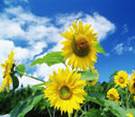
3. Я люблю  и
и 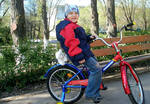 летом.
летом.
4. Тебе нравится 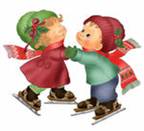 и
и 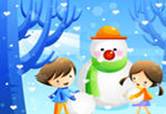 зимой?
зимой?
5.  месяцы это-декабрь, январь, февраль.
месяцы это-декабрь, январь, февраль.
5. Опишите картинку. Расскажите о времени года, погоде, явлениях природы в это время года и занятиях.

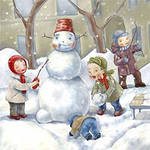
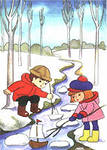
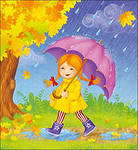
6. Есть праздник, которые мы любим в любую погоду! Расскажите о своем Дне Рождения! (время года, месяц, какая обычно бывает погода, …)
7. 1)Поиграем в метеорологов! Я назову вам город, а вы попробуете угадать какая там сейчас погода! 2) Расскажите о погоде в вашем городе в разное время года.
8. Диалогическая речь.
1) составьте диалог, поставив фразы в правильном порядке.
It’s a wonderful day today, isn’t it?
Hurry up! Let’s go.
Yes, I can, but not very well.
Let’s go to the river, can you swim?
I can teach you swim.
Yes, the weather is fine.
Yes, let’s go.
2) составьте свой диалог по аналогии.
3) Представьте, что вы разговариваете с вашим другом из другой страны. Какие вопросы вы бы задали? Дополните диалог и разыграйте его в парах.
-What season do you like?
-I like … .And what is your favourite season?
-I like… .
-What is the weather like in …?
-It is usually … in Russia in…
-Is it… in…?
-…
-What do you do when it is…?
-When it is … I usually… . And you?
-… .
Комплекс упражнений для развития лексических навыков и письма.
1.поменяйте буквы местами, чтобы получилось слово.
s,y,n,o,w; i,w,t,e,r,n; n,y,n,u,s; l,o,c,o; a,s,e,o,n,s;
2. поставьте слова в правильном порядке и прочитайте предложения:
— weather, I, hot, like; -like, boys, hockey, play, winter, in; -can, ski, we, skate, not, summer, in; -season, my, is, spring, favourite.
3. вставьте пропущенные буквы:
A_g_st; a_t_mn; bi_ _hd_y; u_br_ll_; _lo_dy.
4. работа в группах.
Составьте предложения из данных слов и словосочетаний:
Birds, sky, spring, flowers, to plant, trees, the warmest season, winter months, the Sun is shining, it snows.
Найдите лишнее слово:
warm, cool, hot, birds, cold
spring, jump, winter, summer, autumn
birds, plant, green, grass, songs, read, flowers
april, rain, may, sun, crocodile
Заполните кроссворд:
1. They build their nests in spring
2. The first month of spring
3. There are three month in it
4. It is different in every season
5. The coldest season in a year
6. The warmest season in a year
7. Birds live in it
«Найди ошибку»
It is winter now. Winter is my favourite season! I like it because the weather is often sunny and warm. In winter I and my friends like to ski and swim in the river. Most of all I like New Year. I decorate house and make presents for my family. It is usually hot and frosty on New Year.
Комплекс упражнений для развития навыков чтения.
1. Прочитайте текст и ответьте на вопросы. (Приложение 1)
What are the summer months in Australia?
Why do the Americans call autumn-fall?
Is it cold in spring in Russia, isn`t it?
2. Прочитайте сказку «Принцесса Сентябрь», заполните пропуски подходящими по смыслу словами и ответьте на вопросы.
— Сколько детей было у короля Сиама?
— Как звали дочерей короля?
First the King Siam had two daughters. Their names were Night and Day. Then the king had two more daughters. He gave all his daughters new names: Spring and___, Winter and____. Then the king got three new daughters. And he gave all of them names after the days of week: ____________________________________________________________. But then the new daughter was born. And the king gave all of them new names. The first was January, than ________________________________________________________. And the last was September.
3. Сказка «Облачный домик» (Приложение 1)
4. Read the texts and match them to the titles
spring summer autumn winter1. The days of this season are short and the nights are long. It is cold and frosty and windy. Children like the season. They can ski, skate, and play snowballs. It often snows. It’s slippery and sometimes foggy. Animals are cold and hungry.
2. This season is hot. The weather is sunny and warm. The days are long and the nights are short. It is a beautiful season. The trees are green. Birds sing songs in the parks. Children have the longest holidays. They enjoy this season.
3. This season is not warm. It is cold and often rainy and cloudy. But it is a very beautiful season. The trees are bright. There are a lot of mushrooms in the forests and a lot of fruit in the gardens. Birds fly away to the warm countries.
4. This is a very beautiful season. The weather is fine. The days are long and the nights are short. Birds come back and sing songs. The trees are green.
5. Подпишите картинку (приложение 2)
Темы для проектных работ:
-“Seasons”
-“My favourite season”
-“The weather in my town”
(приложение 3)
Упражнения с использованием Smart Board:
1.Соедините начало и конец слова.
2.Соедините слова противоположные по значению.
3.Разделите слова, обозначающие погоду по группам времен года.
infourok.ru
Упражнения на времена английского глагола. Tenses Exercises.
Предлагаю Вам подборку разноуровневых упражнений на отработку темы «Времена глагола» в английском языке. Уровень упражнений варьируется от Pre-Intermediate до Upper – Intermediate. В упражнениях проверяется только активный залог. Все упражнения предлагаются с ответами. English Tenses Exercises are here!
Вы также можете пройти тест на времена английского глагола.
Упражнения на времена английского глагола. Уровень Pre-Intermediate.
Упражнение 1. Join the two parts of sentences.
1. Fred plays tennis… 2. Fred is playing tennis… 3. Fred has played tennis… 4. Fred played tennis… 5. Fred was playing tennis… 6. Fred will play tennis… | a) every Monday. b) for several times. c) at the moment. d) at that time. e) next Monday. f) when he was 15. |
Упражнение 2. Copy the sentences and note if they refer to the present, past or future. Write the tense against each sentence.
Example: He cut his finger with a knife. (Simple Past)
- He often cuts himself.
- What time did John arrive?
- I never forget anything.
- Are you sitting comfortably?
- We drank a lot of Coke at the party.
- It was raining all night.
- The train will leave in a few minutes.
- I put on a clean shirt yesterday.
Упражнение 3. Put the following sentences into the correct tense: Simple Past, Simple Present, Present Continuous or Past Continuous, Present Perfect.
- I ________ (listen) to the radio while Mary __________ (cook) dinner.
- You __________ (buy) this book yesterday?
- Last Friday Jill __________ (go) home early because she __________ (want) to see a film.
- When your brother usually __________ (get) home in the evening?
- Jane always __________ (bring) us a nice present.
- What those people __________ (do) in the middle of the road?
- You __________ (read) this book?
- While Fred __________ (sleep), Judy __________ (watch) TV.
- When I __________ (be) young, I __________ (think) Mary __________ (be) nice — but now I __________ (think) she’s fantastic.
- Jill __________ (walk) home when she __________ (see) her husband’s car outside the cinema
- Look there! Sue and Tim __________ (run) to school.
- Jack’s father __________ (not work) in London — he __________ (not speak) English.
- Joe __________ (buy) a car yesterday.
- Their father often __________ (go) to rock concerts.
- While you __________ (sleep), mother __________ (arrive).
Упражнение 4. Исправьте ошибки.
- When she was younger, she has played tennis every day.
- It’s already 10:00, but Jane hasn’t finished her homework already.
- Joe crashed his car three times since Christmas.
- Did you done your homework, or have you been watching TV?
- Karl has been driving since five years.
- This hotel has been already in business for twenty years.
Упражнения на времена английского глагола. Уровень Intermediate.
Упражнение 5. Put the verbs in brackets in the correct tense form (Present Simple, Present Perfect, Present Continuous, Past Simple, Past Continuous).
- Alice … (not to take) the bus to school every day. She usually … (to walk) to school…
- (to take) … you the bus to get to school or … (to walk) you?
- Who is this man? I … (to think) that I … (to know) him, but I … (to forget) his name.
- The children … (to have) a good time in the park yesterday. They … (to give) small pieces of bread to the ducks. Then they … (to take) pictures of themselves.
- Where are the children? They … (to watch) TV in the room now. Some minutes ago they … (to play) a game.
- Now I am in my class. I… (to sit) at my desk. I always … (to sit) at the same desk.
Упражнение 6. Раскройте скобки употребляя глаголы в Present Simple, Future Simple, Present Continuous или поставьте конструкцию to be going + to inf.
- When you_____ (know) your examination results?
- Kathy_____ (travel) to Caracas next month to attend a conference.
- Do you have any plans for lunch today? — I _____ (meet) Shannon at the Sham Cafe in an hour. Do you want to join us?
- I ____ (buy) a bicycle for my son for his birthday next month. Do you know anything about bikes for kids? — Sure. What do you want to know?
- How do you like your new job? — I don’t start it until tomorrow. I_____ (give) you an answer next week.
- I suppose he_____ (talk) about his new invention.
- Why are you packing your suitcase? — I_____ (leave) for Los Angeles in a couple of hours.
- My regular doctor, Dr. Jordan, _____ (attend) a conference in Las Vegas next week, so I hope I _____ (meet) her partner, Dr. Peterson, when I _____ (go) for my appointment next Friday.
- What time class _____ (begin) tomorrow morning? — It_____ (begin) at eight o’clock sharp.
- The coffee shop _____ (open) at seven o’clock tomorrow morning. I’ll meet you there at 7:15. — Okay. I’ll be there.
Упражнение 7. Раскройте скобки употребляя глаголы в Future Continuous, Present Continuous, Future Simple или поставьте конструкцию to be going + to inf.
- At 5 o’clock tomorrow he _______ (work).
- He can’t come at noon tomorrow because he _______ (give) a lesson at that time.
- She_______ (read) an interesting book the whole evening tomorrow.
- At 10 o’clock tomorrow morning he_______ (talk) to his friend.
- You will recognize her when you see her. She_______ (wear) a yellow hat.
- He_______ (have a party) on Saturday 4th December in London at 10 pm.
- In the next days you _______ (visit) famous sights.
- Jeanne and Paul_______ (move) to London next month.
- Leave the washing up. -I _______ (do) it later.
- This time tomorrow I _______ (lie) on the beach.
- Look out! You _______ (spill) your tea!
Упражнение 8. Упражнение раскройте скобки, употребляя глаголы в Present Continuous, Present Perfect, Present Perfect Continuous, Past Simple.
- Aren’t you about to finish with the dishes? You _______ (wash) the dishes for thirty minutes or more. How long can it take you to wash the dishes?
- We _______ (go) to the Steak House restaurant many times. The food is excellent.
- A: What is that sound? B: A car alarm _______ (ring) somewhere down the street. It _______ (drive) me crazy —I wish it would stop! It _______ (ring) for more than twenty minutes.
- Can you translate this note from Stockholm? I understood Swedish when I _______ (be) a child, but I _______ (forget) it all.
- What’s that dent in the side of the car? You _______ (have) an accident?
- I’m sorry, John’s not here; he _______ (go) to the dentist. He _______ (have) trouble with a tooth for some time.
- This cassette recorder is broken. You _______ (play) about with it?
- Your Italian is very good. You _______ (study) it long?
- Do you mind if I clear the table? You _______ (have) enough to eat?
- Ann never _______ (go) camping. She _______ (not sleep) in a tent.
- Frank, where have you been? We _______ (wait) for you since 1 p.m.
- I’m not surprised he _______ (fail) that exam. He _______ (not / work) hard recently.
Упражнение 9. Pаскройте скобки, употребляя глаголы в Present Perfect, Past Simple или Present Perfect Continuous.
- Oh no! The children _______ (cook). Look at the state of this kitchen!
- How many times Wendy _______ (be) late for work this week?
- I’m going to give that cat some food. It _______ (sit) on the doorstep for hours. I’m sure it’s starving.
- I _______ (do) grammar exercises all morning. I deserve a treat for lunch.
- You _______ (not / buy) your mother a present? That’s really mean of you.
- She _______ (work) in Australia for 2 years. Then she moved.
- Now where are my keys? This is the third time I _______ (lose) them today
- You _______ (ever/play) chess? You should try it. I’m sure it’s the sort that you’d like.
- Oh do be quiet. You _______ (grumble) all day!
- Your tennis _______ (really / improve)! You _______ (practice) in secret?
Упражнения на времена английского глагола. Уровень Upper -Intermediate.
Упражнение 10. Подчеркните правильно выбранное время.
- I am writing in connection with the advertisement which appeared / has appeared on 12 April.
- I originally studied/ have studied chemistry at university. I graduated / have been graduating with a first-class degree.
- I now completed / have now completed a postgraduate degree in administration.
- I’ve been trying / I’ve tried to find a permanent job for a considerable time.
- Indeed, I have already worked /I have already been working for several companies on a temporary basis.
- In my first job, I was / have been responsible for marketing,
- I’ve been applying / have applied for several posts this year but I did not manage / have not managed to find what I’m looking for.
- The last job I applied / have applied for required applicants to speak some Japanese,
- I started learning / have been learning Spanish a few months ago I did not obtain / have not obtained a qualification in it yet.
- I did not apply / have not applied for a job with your company before.
- I hoped / have hoped that you would consider my application favourably.
- However, I have been waiting/ have waited for a reply for weeks and I still have not received / did not receive any answer.
Упражнение 11. Раскройте скобки, употребляя глаголы в Present Perfect, Past Simple или Present Perfect Continuous.
- Today is Thursday, and John ________ (be) late twice this week; he________ (be) late yesterday and on Monday.
- I first________ (meet) George a month ago, and I ________ (meet) him several times since then.
- It is October now, and we ________ (do) a lot of work this year; we ________ (do) a lot last year too.
- She ________ (buy) a coat last winter, but she________ (not / buy) a new dress since 2008.
- It’s only the middle of the month, and he________ (spend) (already) most of his salary; he ________ (spend) $60 yesterday,
- I ________ (break) my leg in 1991, but I ________ (break) (never) my arm.
- He’s over sixty, and he’s still working. He ________ (work) hard all his life. When he ________ (be) a young man, he sometimes ________ (work) all night.
- The postman ________ (come) at eight yesterday, but it’s now half past eight and he ________ (not / come) yet.
- Today is May 25th. Ted ________ (not / be) absent this month.
- He ________ (feel) extremely ill when he went to hospital, but he ________ (feel) much better since he came out of hospital a month ago.
Ответы:
Упражнение 1.
1 – a, 2 – c, 3 – b, 4 – f,5 – d, 6 – e.
Упражнение 2.
1 Present Simple/indefinite, 2 Past Simple/Indefinite, 3 Present Simple/indefinite, 4 Present Continuous/Progressive, 5 Past Simple/Indefinite, 6 Past Continuous/Progressive, 7 Future Simple / Indefinite, 8 Past Simple/Indefinite
Упражнение 3.
1 was listening / was cooking, 2 did you buy, 3 went / wanted, 4 does your brother usually get, 5 brings, 6 are people doing, 7 have you read, 8 was sleeping / was watching, 9 was /thought /was / think, 10 was walking / saw, 11 are running, 12 doesn’t work / doesn’t speak, 13 bought, 14 goes, 15 were sleeping / arrived.
Упражнение 4.
1 has played ->played, 2 already -> yet, 3 crashed -> has crashed, 4 Did ->have, 5 since -> for, 6 has been already -> has already been
Упражнение 5.
1 doesn’t take /walks, 2 Do you take / Do you walk, 3 think / know /have forgotten, 4 had / gave /took, 5 are watching / were playing, 6 am sitting / sit
Упражнение 6.
1 will you know, 2 is travelling, 3 am meeting, 4 am going to buy, 5 will give, 6 is going to talk, 7 am leaving, 8 is attending / will meet /go, 9 does class begin / begins, 10 opens.
Упражнение 7.
1 will be working, 2 will be giving, 3 will be reading, 4 will be talking, 5 will be wearing, 6 will be having / is having, 7 will visit, 8 are moving, 9 will do, 10 will be lying, 11 will spill
Упражнение 8.
1 have been washing, 2 have gone, 3 is ringing/ is driving /has been ringing, 4 was /have forgotten, 5 have you had, 6 has gone / has had, 7 have you played, 8 have you been studying, 9 have you had, 10 has never gone / has never slept, 11 have been waiting, 12 has failed, hasn’t been working
Упражнение 9.
1 have been cooking, 2 has Wendy been, 3 has been sitting, 4 have been doing, 5 haven’t you bought, 6 worked, 7 have lost, 8 have you ever played, 9 have been grumbling, 10 has really improved, have you practiced
Упражнение 10
1 appeared, 2 studied / graduated, 3 have now completed, 4 I’ve been trying, 5 have already worked, 6 was, 7 have applied / have not managed, 8 applied, 9 started learning/ have not obtained, 10 have not applied, 11 have hoped, 12 have been waiting/ have not received
Упражнение 11.
1 has been / was, 2 met /have met, 3 have done / did, 4 bought / hasn’t bought, 5 has already spent / spent, 6 broke / have never broken, 7 has been working hard / was / worked, 8 came / hasn’t come, 9 hasn’t been, 10 felt / has felt
На сайте есть упражнения на все времена английского глагола, а также примеры предложений в разных временах. Найти все это можно в рубрике ВРЕМЕНА.
Понравилось? Сохраните на будущее и поделитесь с друзьями!
grammar-tei.com
